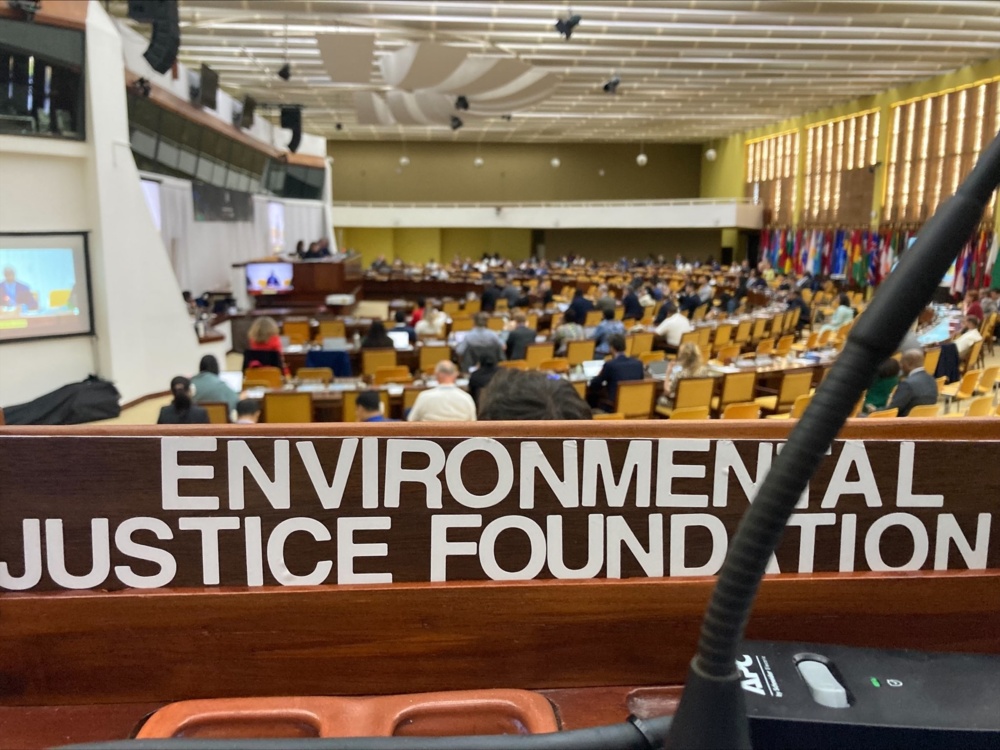
A first victory against the rush to deep-sea mining
A new industry is threatening our ocean. However, even though exploitation applications for deep-sea mining can now be submitted, the negotiations at the Council meeting of the International Seabed Authority (ISA) were a first, qualified success.
The ocean depths are home to large deposits of copper, nickel, manganese and cobalt, minerals used to make car batteries, wind turbines and solar panels. Proponents of deep-sea mining claim that it is necessary to achieve the energy transition, which is false. Mining companies are waiting in the wings, urging states to let them mine the deep ocean.
There are still no rules regulating commercial deep-sea mining in international waters. Nevertheless, since the beginning of July 2023, applications to mine deep-sea minerals can now be submitted to the International Seabed Authority (ISA). This means unregulated deep-sea mining is theoretically possible, although a large and growing number of states reject an introduction at the present time. Critically, these states succeeded at securing a further pause in the actual start to mining - a step in the right direction.
How could it come so far?
This dangerous situation became possible because the island state of Nauru triggered a special provision in international law, the so-called "two-year rule". This gave the 168 ISA member states and the EU only 24 months to develop and adopt regulations on deep-sea exploitation before funding applications could be submitted - with or without a framework.
The two-year rule trigger put enormous pressure on states to finalise the regulatory framework by 9 July 2023. That didn't happen. States rejected the calls from mining companies to rush an agreement to suit their bottom line, at the cost of the ocean. Far from being a failure, the negotiations are a strong signal of growing opposition to deep-sea mining and a significant setback for the highly speculative industry.
What is at stake
The oldest animals on Earth are found in the deep sea. Other creatures depend on the minerals as habitat; if they disappear, a part of the ocean disappears forever. Deep-sea mining will inevitably lead to a massive and potentially irreversible loss of biodiversity. It will disrupt ecosystems and affect the carbon cycle, with consequences science does not yet understand. Unlike on land, this vulnerable deep-sea environment would never recover on human timescales. In addition, research suggests that fish populations may dwindle, and toxic metals may be absorbed into food chains. This would have disastrous human consequences, particularly for coastal communities.
Profit at the expense of our ocean
The ISA has structural problems that give mining companies a large degree of influence. Sensitive data on mineral-rich areas is being passed on to companies. The neutrality of the ISA’s management was questioned by Franziska Brantner, German Parliamentary State Secretary of the Federal Ministry for Economic Affairs and Climate Protection (BMWK), in an unusually sharp letter in March.
In addition, the ISA excluded observers from critical negotiation phases during the Council meeting - in particular the handling of the two-year rule - while allowing industrial companies to participate directly. This made it much more difficult to monitor political processes and curtailed a key role played by civil society. In fact, mining companies have been directly involved in the negotiations for years - as members of state delegations.
Mining companies claim that deep-sea minerals are essential for the energy transition and meeting the Paris climate targets. This statement is false and poses enormous risks to the already distressed health of our planet. Scientific analyses as well as central research institutes such as the European Academies’ Science Advisory Council have rejected this argument.
There are also studies that put the future demand for minerals at astronomical levels. But forecasts like the International Energy Agency's are based on a "business-as-usual" approach and do not take into account any innovation in battery technologies. Carmakers like Tesla and Hyundai already use batteries that do not use copper and nickel. More importantly, these forecasts are based on a linear economic model that aims for unlimited growth.
Growing resistance and victory for the opposition
More and more companies, researchers, environmental organisations and Indigenous people around the world are speaking out against deep-sea mining. Meanwhile, 21 countries - at the time of writing - are in favour of a moratorium or a pause. Switzerland, Portugal, Sweden, Ireland and Brazil have joined this group of countries in the ISA negotiations in recent weeks.
Likewise, 36 international financial institutions, which represent a combined value of 3.3 trillion US dollars, opposed deep-sea mining. The United Nations Commissioner for Human Rights called for a moratorium, as did fishing associations which together account for a third of the world's tuna catch.
The most important agenda item of the negotiations, as rated by observers and delegates, was how to deal with the two-year rule. The Secretariat set only two half-days for this and made an unexpected, controversial proposal for a timetable for finalising the regulations. Fortunately, states critical of deep-sea mining defied the proponent countries and rather than setting a new deadline for the adoption of the regulations, negotiated a timeline with little binding force which aims to finalise the regulations in 2026.
Clear rejection of a high-risk industry
For decades, we have been using more resources than our planet provides. We want more, we produce more and we waste more - especially industrialised countries like Germany and the United States. The United Nations estimate that the amount of e-waste will rise to 70 million tonnes worldwide by 2030. We waste 1,160 tonnes of copper per year solely through the production of single-use e-cigarettes. It is this unquestioning assumption of abundance and a lack of a circular economy that is pushing our planet beyond its breaking point.
The destruction of pristine habitats cannot be the answer to our unbridled demand for resources. Deep-sea mining is incompatible with international commitments to address the biodiversity and climate crises; it is not the "cure" for the energy transition, nor will it help us successfully navigate the transition to a sustainable future - instead, it perpetuates a way of life that is destroying our livelihoods before our eyes.
We need to reduce our demands and make every effort that will lead us to a circular and sustainable economic model. There is no place for deep-sea mining in a greener and fairer world - neither for us now, nor for future generations.
This piece was originally published by energiezukunft.
SIGN UP FOR OUR EMAILS AND STAY UP TO DATE WITH EJF

